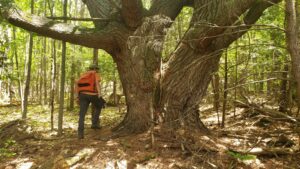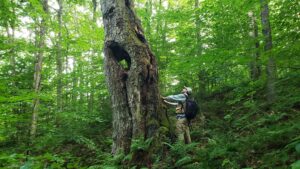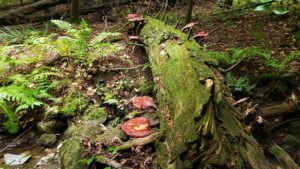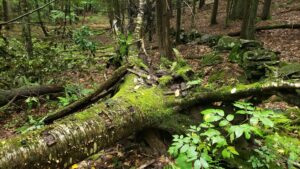Old Forest Ecology: The Wonders & Mysteries of our Ancient, Gnarled, & Majestic Old Woods

Instructor: Shelby Perry & Bob Zaino
September 7 - 8, 2024 | $285
Course size: 12 students
Financial support available (contact us)
O
ld forests capture a special place in our imagination, and they provide important ecological functions, especially in a changing climate. In this course, we will visit some of the few remaining patches of old forest in Vermont. We start by considering the history of Vermont’s forests, and learn why old forests are now so rare on the landscape. We will discuss and explore the unique characteristics of old forests, and we will learn how to recognize old forests in a variety of ecological settings. We’ll decide whether an old forest needs to have old trees, and in what circumstances they might not. We will identify indicator mosses and lichens, dig into the biotically rich soils, and use an increment borer to study tree rings. Finally, we will reflect upon the science and practice of conserving and restoring old forests in the Northeast.
Course Goals & Objectives
- Learn to identify indicators of old forests and old forest processes at work.
- Practice measuring trees and understanding how carbon is calculated, including some of the drawbacks to these models.
- Become familiar with the history of the forests of the Northeast, particularly Vermont.
- Become familiar with some of the old forests of Vermont.
- Learn about the ecological research related to old and old-growth forests, in the Northeast and elsewhere.
- Learn about the underground world of old forests.
- Identify the tree species, and a few lichens and mosses, common to Vermont’s old forests.
- Learn a few basic field ecology techniques.
- Consider the social and ecological aspects of old forest conservation: discuss the different tools used to protect existing old forests, and provide for the development of new ones
About the Instructor
Bob Zaino is an ecologist who revels in exploring the natural world. As a scientist with the Vermont Fish and Wildlife Department, he works to understand the patterns, distributions, and myriad species of Vermont’s natural communities. His field work on state-owned lands has led him to many of Vermont’s remnant patches of old forest. As a hiker, climber, and paddler, he relishes spruce-clad mountains, granite cliffs, and remote northern waters. Bob strives to connect people to nature, and to protect plants, animals, and wild places for the future. He is a graduate of Bowdoin College and has a master’s degree from the University of Vermont’s Field Naturalist Program. Bob Zaino, together with Liz Thompson and Eric Sorenson, are co-authors of Wetland, Woodland, Wildland, A Guide to the Natural Communities of Vermont.
Shelby Perry is an ecologist and naturalist specializing in old and rewilding forests. She works as Wildlands Ecologist at Northeast Wilderness Trust, and spends her days mapping natural communities, looking for old forests, measuring trees, and learning from her wild kin, from the largest trees to the tiniest slime molds. Shelby joined the Wilderness Trust in 2016 with a B.S. in Environmental Engineering from Rensselaer Polytechnic Institute, a master’s degree from the University of Vermont’s Field Naturalist Program, and a deep love and respect for wild places. She had previously spent two years documenting and advocating for wilderness in Wyoming’s Red Desert, and served terms in both AmeriCorps and the US Peace Corps. When not working in old forests, Shelby can usually be found playing in them. She enjoys exploring wild places on foot and through photography, science, and artwork.
Physical Requirements
Participants must be able to walk 5+ miles over the course of each day off trail over uneven and potentially muddy terrain. Participants should be comfortable outside in potentially hot, muggy, wet, and/or buggy conditions for long periods of time. Participants must be comfortable climbing over, under, and through debris in the forest. Please reach out to us if you have any questions about mobility and/or other accessibility needs.
Recommended Reading
We recommend that you acquire a copy of the second edition of Wetland, Woodland, Wildland and read at least pages 90-110 before the course begins.
Additional resources:
- Here is a 2019 episode of Brave Little State, featuring Bob Zaino who helps answer the question: Does Vermont Have any Patches of Old Growth Forest?
- Browse NEWT’s Library of Wild Works papers, literature reviews covering the topics of carbon and biodiversity in old forests.
- A fascinating 2020 story about the underground world of old growth forests of the Northwest can be found here.
- A quick and easy read, this article from Smithsonian Magazine about Bob Leverett gives a great overview of some of the recent work around old forests and carbon.
Meals
Participants should bring their own lunches and snacks.
Timing
Course begins 9 AM on Saturday at North Branch Nature Center and concludes by 5 pm. Course begins on Sunday at a time and location of the instructors' choosing and concludes by 5 PM on Sunday.
Academic Credit / Professional Development
This course may qualify for 1 graduate-level credit for an additional $200 course fee. All BioU courses may be accredited by Castleton University. Participants interested in receiving credit must contact us at one month in advance so we have time to arrange course accreditation.
It is the student’s responsibility to ensure that home institutions will accept the credit. Participants pursuing academic credit will be required to complete an additional assignment above and beyond the course hours, including literature review, reflective writing, or a field-based project.
This course qualifies for 20 hours of professional development hours and continuing education units. Certificates of completion are provided at the conclusion of the course.
Cancellation Policy
While we realize that unexpected circumstances arise that are out of our control, North Branch Nature Center cannot guarantee refunds for registrations cancelled within 30 days of the course. If a cancellation occurs within this window, NBNC will attempt to fill the space from our wait list and provide a full refund. If the course needs to be cancelled by NBNC, we will provide a full refund.
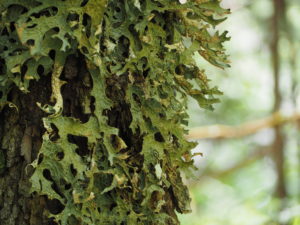
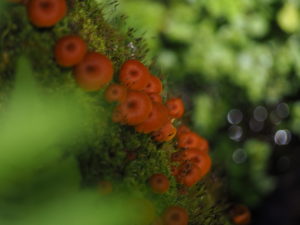
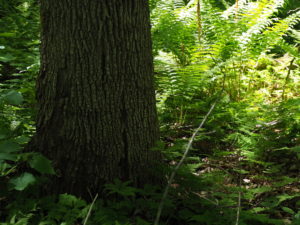

713 Elm Street
Montpelier, Vermont 05602
(802) 229-6206
Hours: Center Open Monday-Friday 9-4
Trails Open 24/7

